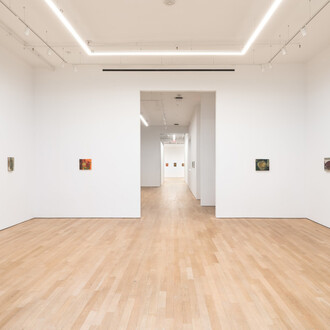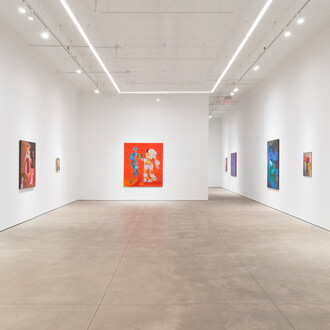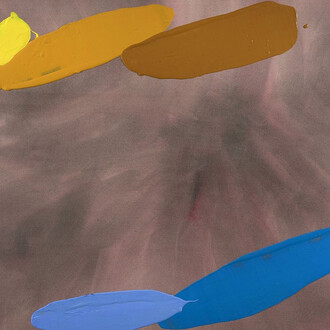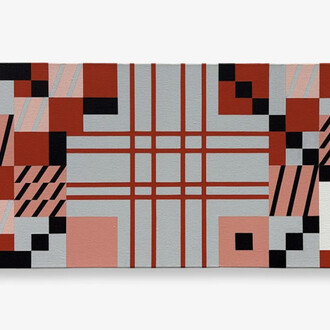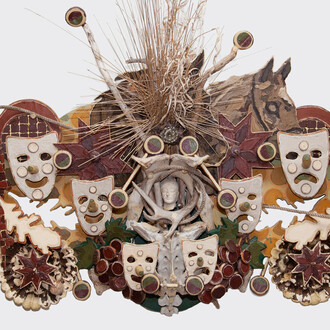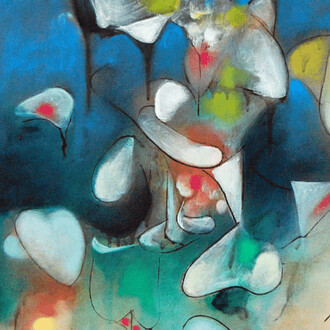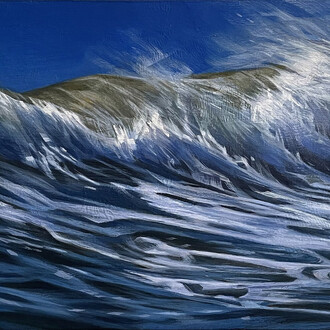P·P·O·W is pleased to present the two-person exhibition Hunter Reynolds / Dean Sameshima: Promiscuous rage, an intergenerational pairing of two artists deeply concerned with the investigation and preservation of queer histories, their concomitant subcultures, and inherent gaps. This presentation marks the first exhibition of Reynolds’s work since the artist’s passing in 2022, as well as the first display in New York of Sameshima’s iconic Anonymous portrait series. Taken together, the paintings, photo-weavings, and interactive installation on view index an archive of underrecognized texts and figures foundational to both artists’ sense of self, and through their display highlight the synchronous feelings of loss and empowerment that accompany the open expression of twentieth-century gay culture.
Throughout his life, Reynolds concerned himself with transcendence through prosaic means, as exemplified by the artist’s photo-weavings. Reynolds began creating these quilt-like composites of sewn snapshots in the early-1990s after seeing his friend and fellow artist Jack Brusca’s “wall of angels”, a section of Brusca’s studio covered in photos of friends and lovers, many of whom were HIV-positive or had died from AIDS. When Brusca’s own health began to deteriorate, confining him to the hospital, Reynolds re-photographed the wall of angels, sewing them into a quilt that he then laid on the empty hospital bed next to his ailing friend. While the quilt-covered-beds on view in Promiscuous Rage indicate this sense of loss and emptiness, they likewise function as celebratory monuments, providing visual, poetic documentation of a universal determination to survive in the face of adversity and erasure.
Sameshima picks up this torch with his Anonymous portrait works, an ongoing series of painted and printed compositions that the artist began in 2018. Inspired by the first page of John Rechy’s 1977 novel The sexual outlaw—which the author dedicated “to all the anonymous outlaws”—Sameshima’s series references titles from the artist’s personal library of queer, art historical, and critical texts, using each work’s distinct typeface literally and figuratively positioned under a broader umbrella of anonymity. Similar in form and seriality to On Kawara’s Date paintings, Sameshima’s Anonymous Portraits likewise allow the viewer to project their own impressions onto allusions specific to the paintings’ creator. In this way, Sameshima not only transposes the subjective into the universal, but also preserves a queer archive so frequently discarded due to censorship and fear of discovery.
These gestures carry over to Reynolds’s communal installation Dialogue table 3, my first year out, 1992, a collection of publications, periodicals, and polaroids that reveal the artist’s own interests and fantasies, while simultaneously inviting participatory engagement. As the title of the work implies, Reynolds would activate this sculptural library, encouraging dialogue and communal remembrance through the aesthetic combination of image, text, and personal recollection, thereby democratizing the gallery space. For both Reynolds and Sameshima, this alchemical accumulation of lost figures and texts, lovers and smut, turns the political into the personal, in memorialization of the past and in pursuit of a liberation still in progress.
P·P·O·W will activate Dialogue table 3 with a daylong program of speakers on Saturday, December 14, 2024, inviting participants to express their own spoken memories of growing up in the age of AIDS, coming out, and queer ancestry.
Hunter Reynolds (b. 1959, Rochester, MN; d. 2022, New York, NY) was the recipient of many grants and residencies, including several Pollock Krasner awards. During his lifetime, he presented solo exhibitions at P·P·O·W, New York, NY; Hales Gallery, London, UK; Participant Inc., New York, NY; Artists Space, New York, NY; White Columns, New York, NY; Creative Time, New York, NY; and Yerba Buena Center for the Arts, San Francisco, CA; among others. His work has been included in group exhibitions at institutions such as the Museum of Arts and Design, New York, NY; the Hayward Gallery, London, UK; the Flag Art Foundation, New York, NY; the Institute of Contemporary Art, Boston, MA; Aldrich Museum of Art, Ridgefield, CT; and Documenta, Kassel, Germany; among others. Public collections that house his work include: the Art Institute of Chicago, IL; Yale University Art Gallery, New Haven, CT; the Addison Gallery of American Art, Andover, MA; and Musée d’Art Moderne et Contemporain de Strasbourg, France. In 2017, New York University’s Fales Library and Special Collections acquired Hunter Reynolds’ archives for its Downtown Collection.
Dean Sameshima (b. 1971, Torrance, CA) lives and works in Berlin. Sameshima most recently participated in the 60th International Art Exhibition of La Biennale di Venezia, curated by Adriano Pedrosa, in Venice, Italy. Recent and forthcoming exhibitions include Digital capture: Southern California and the origins of the pixel-based image world at California Museum of Photography, Riverside, CA (2024); Scratching at the moon at ICA, Los Angeles, CA (2024); Revolt of the body at Tina Kim Gallery, New York, NY (2023); being alone at Queer thoughts, New York, NY (2023); Radical perverts: ecstasy and activism in queer public space at Museum of Sex, New York, NY (2023); Politiken der berührung (Politics of touch) at Amtsalon, Berlin, Germany (2023); Kino Roland at Kino Roland, Zurich, Germany (2022); and Evidence: selections from the permanent collection at MOCA, Los Angeles, CA (2021). Sameshima is in the permanent collections of the Getty Museum, Los Angeles; Los Angeles County Museum of Art, Los Angeles, CA; Museum of Contemporary Art, Los Angeles, CA; and the Henry Art Gallery, Seattle, WA, and was the 2022 recipient of The Artist Acquisition Club award in Los Angeles, CA. In 2025, Sameshima will have his first solo institutional exhibition at Neuer Aachener Kunstverein, Aachen, Germany.





